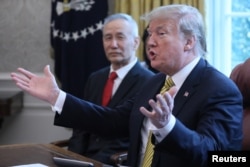VOA Mandarin Service reporter Lin Feng contributed to this report.
STATE DEPARTMENT — The United States and China are striking a positive tone ahead of next week's talks in Beijing, aimed at ending a trade war, as both countries work toward a trade deal.
"We're doing well on trade, we're doing well with China," U.S. President Donald Trump told reporters as he departed the White House for an event in Florida on Wednesday.
Washington and Beijing have held several rounds of talks this year to resolve a trade war that began last year when Trump imposed punitive tariffs on $250 billion worth of Chinese imports He hoped to compel Beijing to change its trading practices. China retaliated with its own tariff increases on $110 billion of U.S. exports.
Next week, two senior American officials travel to Beijing to resume trade negotiations.U.S. Treasury Secretary Steven Mnuchin and U.S. Trade Representative Robert Lighthizer will meet with Chinese Vice Premier Liu He on April 30. The two sides will discuss intellectual property, forced technology transfer, non-tariff barriers, agriculture, and other issues.
Vice Premier Liu will then lead a Chinese delegation to Washington for additional talks the following week, on May 8, according to a White House statement.
In Beijing, Chinese officials said Wednesday that "tangible progress" has been achieved on trade with the U.S.
"Both sides are also maintaining communication. We believe that both sides' trade delegations can work together, meet each other halfway and work hard to reach a mutually beneficial agreement," according to Chinese Foreign Ministry spokesperson Geng Shuang.
As the United States and China appear close to reaching a negotiated settlement over trade disputes, a group of American business and retailers called for a "full and immediate removal of all added tariffs" on Chinese goods in a deal, saying anything less would be a "loss for the American people."
On Monday, business groups from "Americans for Free Trade" asked the Trump administration to "fully eliminate tariffs" on Chinese goods, saying tariffs are taxes that American businesses and consumers pay.
"Americans have paid over $21 billion in taxes due to the imposition of new tariffs," said a letter to President Trump on April 22.
But some experts say the administration lacks confidence in China's enforcement of a trade deal, and predict some punitive tariffs are likely to remain.
"I cannot imagine China accepting a deal where all the tariffs stay in place. I don't see how (Chinese President) Xi Jinping can take that to his people. There has to be something for China. On the other hand, I guess I will be surprised if the U.S. removed all of the tariffs because clearly, the USTR team would like to keep at least some of them in place," David Dollar, Brookings Institution's senior fellow, told VOA Mandarin.
"The smart thing would be to remove the tariffs on all of the parts and components, and perhaps on some consumer goods. It seems likely to get that compromise," he added.
The U.S. market accounts for roughly 18% of Chinese exports. That number reaches 40% when including the European Union and Japan.
And while the administration has mostly utilized unilateral measures and bilateral negotiations to address trade disputes, former U.S. trade officials say now is the time for Washington to work with like-minded allies on trade challenges.
Numerous countries share concerns about China's state-led economic model, according to former Acting Deputy U.S. Trade Representative Wendy Cutler.
In the EU-China Strategic Outlook published on March 12, the European Commission called China a "systemic rival," and identified "China's proactive and state-driven industrial and economic policies" as areas of concern.
Cutler, now the Asia Society Policy Institute's vice president, said in a recent publication that a joint effort in a coordinated campaign would provide the United States and other countries stronger negotiating leverage.







